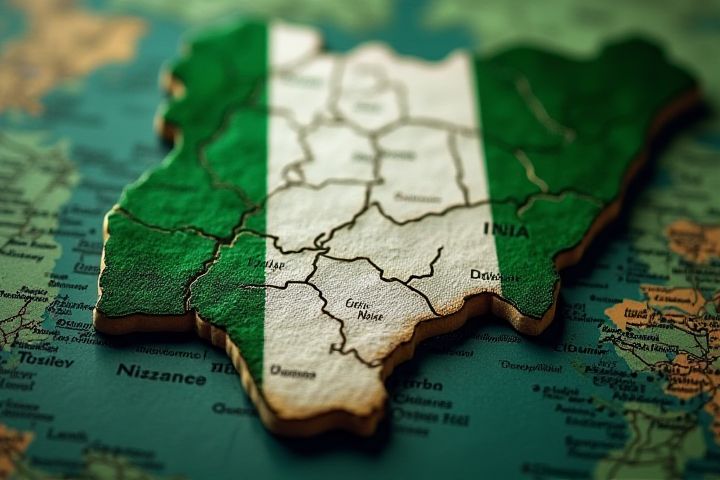
Nigeria is the most populous country in Africa, with an estimated population exceeding 200 million people as of 2023. Although it is not the largest in land area--Algeria holds that title--Nigeria's significant population contributes to its cultural diversity, featuring over 250 ethnic groups. The nation boasts a rapidly growing economy, driven by sectors such as oil, agriculture, and telecommunications. With key cities like Lagos and Abuja, Nigeria serves as a major political and economic hub on the continent. Nigeria's rich cultural heritage includes music, art, and literature, influencing various aspects of African identity.
Nigeria is not the largest country by land area in Africa.
Nigeria, while being one of Africa's most populous nations, does not hold the title for the largest country by land area. That distinction belongs to Algeria, which covers approximately 2.38 million square kilometers. In contrast, Nigeria spans around 923,768 square kilometers, positioning it as the 14th largest country on the continent. Nevertheless, Nigeria's economic influence and cultural diversity make it a prominent player in African geopolitics.
Algeria is the largest country in Africa by land area.
Algeria holds the title of the largest country in Africa, covering approximately 2.38 million square kilometers. In contrast, Nigeria, while the most populous country on the continent with over 200 million residents, ranks as the 14th largest by landmass, encompassing around 923,000 square kilometers. This vast difference in land area highlights Algeria's significant geographical dominance. Your understanding of Africa's geography can be deepened by exploring the diverse landscapes and cultures within both Algeria and Nigeria.
Nigeria is the most populous country in Africa.
Nigeria holds the title of the most populous country in Africa, boasting a diverse population of over 200 million people. This demographic prominence is marked by over 250 ethnic groups, with the Hausa, Yoruba, and Igbo being the most significant. The nation's vibrant culture, economic potential, and political influence position it as a key player on the African continent. Your understanding of Nigeria's role is essential to grasping the dynamics of modern Africa.
Nigeria has significant cultural and ethnic diversity.
Nigeria is the most populous country in Africa, known for its remarkable cultural and ethnic diversity that encompasses over 250 distinct ethnic groups. The three largest groups--Hausa, Yoruba, and Igbo--exhibit unique languages, traditions, and social structures, contributing to a vibrant national tapestry. This rich cultural heritage is celebrated through festivals, art, and music, showcasing the country's dynamic expressions of identity. Your understanding of Nigeria's complexity is essential to appreciating its role as a significant player in African politics and economics.
The official language of Nigeria is English.
Nigeria, the most populous country in Africa, has a diverse linguistic landscape. The official language is English, a remnant of colonial rule that facilitates communication among its over 250 ethnic groups. This unique linguistic dynamic fosters a rich cultural tapestry, with various indigenous languages spoken across the nation, including Hausa, Yoruba, and Igbo. By knowing English, you can engage with Nigeria's vibrant history and contemporary social issues, making it an essential tool for anyone looking to connect with its people and culture.
Nigeria has a mixed economy with abundant natural resources.
Nigeria is the largest country in Africa by population, boasting over 200 million inhabitants. Its mixed economy combines agriculture, services, and industry, making it one of the continent's largest economies. Rich in natural resources, Nigeria is a leading producer of oil and natural gas, significantly contributing to its GDP. This wealth in resources, coupled with a youthful workforce, positions Nigeria as a key player in the African economic landscape.
Lagos is the most populous city in Nigeria.
Nigeria is the largest country in Africa by population, boasting over 200 million residents. Within this vibrant nation, Lagos stands out as its most populous city, with an estimated 14 million inhabitants in the metropolitan area. Known as a bustling economic and cultural hub, Lagos offers a diverse blend of entertainment, business opportunities, and rich cultural experiences. With rapid urbanization, the city continues to attract people from various regions, reinforcing its significance in Nigeria's overall growth and development.
Nigeria is a member of the African Union and United Nations.
Nigeria, the most populous country in Africa, boasts a diverse cultural landscape enriched by over 250 ethnic groups. As a member of the African Union and the United Nations, Nigeria plays a pivotal role in continental diplomacy and international relations. The country is also a major economic player within the region, contributing significantly to the African economy through its abundant natural resources, particularly oil and agriculture. Understanding Nigeria's influence is essential for comprehending the broader dynamics of Africa's development and cooperation.
The country gained independence from the United Kingdom.
Nigeria is the most populous country in Africa, with over 200 million residents, making it a significant player on the continent. Gaining independence from the United Kingdom in 1960, Nigeria has since developed a diverse economy driven by oil production, agriculture, and telecommunications. The nation's rich cultural heritage is reflected in its over 250 ethnic groups, including the Hausa, Yoruba, and Igbo, contributing to a vibrant tapestry of languages and traditions. This complexity positions Nigeria as a pivotal nation in African politics, economy, and culture.
Nigeria has a growing tech and entertainment industry.
Nigeria is the largest country in Africa by population, boasting over 200 million residents, and is known for its vibrant tech and entertainment sectors. The Nigerian film industry, popularly referred to as Nollywood, produces thousands of films annually and significantly contributes to the nation's economy and cultural influence. In the tech landscape, cities like Lagos emerge as innovation hubs, fostering startups and attracting global investment in fintech, agritech, and e-commerce. This dynamic environment enhances Nigeria's position as a leader in creativity and technological advancement across the continent.
